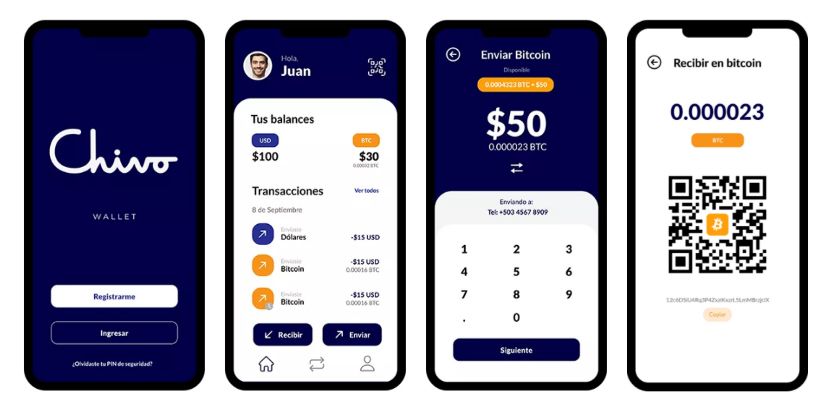
On April 25, Becker Friedman Institute for Economics at the University of Chicago published a paper “Are Cryptocurrencies Currencies? Bitcoin as Legal Tender in El Salvador”. Authors studied the potential of a cryptocurrency to become a medium of exchange based on the experience of El Salvador, the first country to make Bitcoin legal tender. To support the novelty, the Salvadoran Government launched an app called “Chivo Wallet,” which allows users to digitally trade both Bitcoin and dollars without paying any transaction fees.
Chivo Wallet App. Screenshots from chivowallet.com
Opinions on the early results of this implementation are divided. For some crypto enthusiasts, El Salvador has become a place of pilgrimage. Some Bitcoin users, on the contrary, get disappointed when they challenge the Chivo system in the field.
Here we describe why: “El Salvador: using cryptocurrency in the first country to approve bitcoin as legal tender”
The survey, which involved 1,800 households, was conducted via face-to-face interviews to find out the Salvadoran population’s attitude toward the new means of exchange.
To begin with, the study highlighted that more than half of the population still uses only cash to pay for their expenditures. In fact, it was the most popular reason not to download Chivo. Add to this the fact that 80% of businesses do not accept cryptocurrency as a payment method and you have a country with surprisingly high cash payment share to be the first adopter of cryptocurrency.
Another insight carried out by the research is that a $30 bonus became the primary motivation for respondents to download Chivo. This “paid traffic” did not prove successful: over 60% did not use Chivo Wallet after spending their sign-up bonus. Critics also point out that this bonus activates dollar functionality, not crypto, thus turning the Bitcoin experiment into a local version of PayPal.
Even those who become active Chivo wallet users use it four times more frequently for dollar payments, not Bitcoin. This is justified because Chivo is serving several purposes; bitcoinization is just one of them. The thing is, many lower-income people didn’t have access to bank accounts due to high costs, so no-fee Chivo meets their needs as a bank and payment system.
Overall, we can conclude that, despite the big push exerted by the government, Bitcoin is not being widely used as a medium of exchange. But after all, it’s not even a year since the innovation was introduced, and it is too soon to strike a balance.

